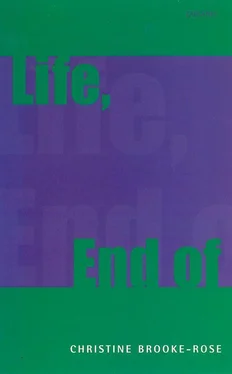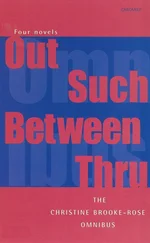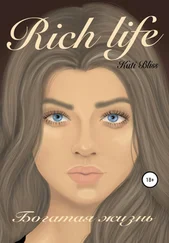Christine Brooke-Rose - Life, End of
Здесь есть возможность читать онлайн «Christine Brooke-Rose - Life, End of» весь текст электронной книги совершенно бесплатно (целиком полную версию без сокращений). В некоторых случаях можно слушать аудио, скачать через торрент в формате fb2 и присутствует краткое содержание. Год выпуска: 2012, ISBN: 2012, Издательство: Carcanet Press Ltd., Жанр: Современная проза, на английском языке. Описание произведения, (предисловие) а так же отзывы посетителей доступны на портале библиотеки ЛибКат.
- Название:Life, End of
- Автор:
- Издательство:Carcanet Press Ltd.
- Жанр:
- Год:2012
- ISBN:9781847775726
- Рейтинг книги:5 / 5. Голосов: 1
-
Избранное:Добавить в избранное
- Отзывы:
-
Ваша оценка:
- 100
- 1
- 2
- 3
- 4
- 5
Life, End of: краткое содержание, описание и аннотация
Предлагаем к чтению аннотацию, описание, краткое содержание или предисловие (зависит от того, что написал сам автор книги «Life, End of»). Если вы не нашли необходимую информацию о книге — напишите в комментариях, мы постараемся отыскать её.
by a master of experimental novels finds the author reflecting on her old age and its effects on her writing. As she reflects on her own career, her experiments with narrative, and on the narrative she writes here, she ultimately reasserts herself and accepts the life behind her.
Life, End of — читать онлайн бесплатно полную книгу (весь текст) целиком
Ниже представлен текст книги, разбитый по страницам. Система сохранения места последней прочитанной страницы, позволяет с удобством читать онлайн бесплатно книгу «Life, End of», без необходимости каждый раз заново искать на чём Вы остановились. Поставьте закладку, и сможете в любой момент перейти на страницу, на которой закончили чтение.
Интервал:
Закладка:
The contact of ground and body through the earthed plugs of hip or tum, though found again, is less reassuring than before, even less reassuring than the first few times on the zimmer. And all the movements everywhere evince a little more swaying, near-falling, gripping, clutching, anginal laceration, cerebral nothingness, as if the world were moving away. No question of walking, or even standing a split second, without the zimmer now. At last, however, the computer is reached once again, and friends.
But for how long? The hands, now so necessary, that pick up objects, are becoming a good deal clumsier, dropping things and trembling very slighly but uncontrollably when threading a needle or tinily screwing one half of the nail scissors to the other half. Soon that is gone. The typing, once touch-typing and swift, slows down to a beginner’s speed. And even then produces five typos and three squashed intervals per line, costing each time two whole minutes to correct and creating yet another non-access: writing. And a burotico-neurotic attitude to the computer. And soon, to those friends.
The doctor comes at last — well, not asked for till now, and now only for a renewed prescription. After her forecast of two weeks to heal, instead of eight, she vanishes again, no doubt rushed off her feet with winter ailments. She seems indifferent to an illess she can’t cure, despite the complicated cross-links Vasco de Gamma and Polly Kettle On, who is causing the most pain. Or is she?
Doctor, do you think the polyneuritis is now spreading to the other two extremities, the hands?
Not necessarily.
So, no change on that front either. And despite the easier walking, the only worsening change is that the loss of balance, the leg-flinching and the burning feet have leapt a stage further now than the one they’d reached before the fall, dear Eve, did she have all that trouble, legs versus cardio-vasco-de-gamma-totale plus double sprain?
A pigeon sits on the snub nose of the bigger Artemis at the end of the row, picking at it.
So images loop, like life. Embedded for the bedridden. The ipomea is dying, drooping on fragile stalks and revealing the old top-row heads again, from Artemis to Athene, including Christ, his eyes still faintly up towards his reversed baseball cap or the whole sky as entablature, as well as the Duchess or is it the White Queen, Beethoven, Haydn, Nietzsche, Mozart, Sir Walter Raleigh, the smaller Artemis and the three-floored severe Beckett or St Paul, the tiny tyrannosaur, the drunken tortoise? The only blue flowers left are on the chin of three-storied Artemis at the end of the row, and they’re mauve, and in a dying cluster. The large leaves of the ipomea are slowly crinkling, to turn brown and dry in winter.
Does all this mean access to the cultural constructs of afterlives? And is it desirable? For Omega People perhaps. Either way, the last freedom is still accessible. But maybe not for long, if more falls or calamities follow, with more and more dependence.
Which is also access.
Who speaks?
There occurs a mild surprise: the first O.P., Oenone, never mentioned or heard of again here, writes a charming e-mail with New Year wishes. Not habitual, so perhaps sincere, as if unaware of the trouble caused to a disabled person? Or a subtle, carefree form of apology, or rather, of awareness without dragging it all up? Or is the whole episode imagined by the malade imaginatif?
Unexpected reaction: the blame if any is quietly shouldered: lovely to hear from you. I thought I must have irritated you as an invalid, killing off our old friendship, etc., bringing about a kindly answer, that friendships mean occasional irritations, in other words, leaving the blame safely here. Fine. What does it matter? It’s easier to shoulder the blame, if only with one shoulder, than to harbour it. Pleasurable even. For these messages, even if conventional, allow the source an easy sliding from O.P. back to F., if not quite T.F. Like all the other apparent O.P.s described but turning out not to be. Except perhaps for the one and only American, the unknown one, who remains so. All this must mean something. Yes, that the loss of independence also brings the loss of good sense.
For isn’t the whole O.P. consruct a deepdown looking-glass transfer? We can all annul the other, and the disabled more easily. So what? Why those degrading angers? This is one of the many things to learn, and accept. Annulment is ahead anyway. And isn’t the so-called generous method of dropping a very twisted feeling of superiority, wilfully risking a bad reputation for reproaches, not for peace but from dregs of vanity?
The man from Ill Locutions is wrong. O.P.s are not the chief problem of invalids, permanent dislocation is, the permanent withdrawal into the devising of physical acrobatics for every movement. O.P.s behave just like everyone else, including oneself when younger. The time, the time for everything is gone.
Now that the hands cause ten errors and two spaceless phrases per line, now that writing itself is more and more exhausting and confused, and eyes more and more glaucomish, and legs more and more furious, the three most precious gifts have become deprivations, soon to be reached: reading, writing, and independence.
However, and for the moment, these are minimal pleasures, still just available. Their minimality is itself a pleasure, the way rarity is, but unlike rarity it does become more and more minimal as time slouches forward.
The phantom visitors never return even here. The leafy devils have been cut down. The stone ghosts, far from entertaining, seem polpotty with skulls. The bilocation fantasies have gone, based as they were on property and material goods, relics of life’s mere hunkering levels. Here the providential table has become a real danger, unable to support the deeper pressure now needed on the zimmer for balance. I learn the risky trick of moving the table with one hand and the zimmer with the other. Or rather, the new discovery: to shoo the once again magic table a metre or two ahead and follow on the zimmer, so as to eat in the armchair and not at the tiny folding kitchen-table facing the dumb radiator. The trip is long and risky, for using one hand on half a zimmer while giving the push could overturn it. Moreover the light table does after all wiggle its wheels when shooed, the difference with the airport ones being after all only that they can change direction all the time, even when being pushed. So now the table’s wigglies wiggle and it turns suddenly to knock into the fridge or cooker. Still, it preserves independence, for a while at least. For sometimes it does just the opposite, swerving gracefully all on its own to go through the door into the next room. Just like life.
The measure of the worsening legs lies in the two-kilo weights round the ankles that used to be part of the exercises, unimaginable now. Dropped also is the regular testing of the blood pressure twice a day, orthositting and orthostatic, the boredom of it, as if the impoverished life is not already too hard to bear, the main reason for desiring exit. Why not allow it to rise and burst and provide the solution? Besides, the doctor no longer even requests it.
Watching or feeling the body language of all the body bits is a little desolating. Many are in a far worse state and accept all solutions. One man shown as able to move only one eyelid, dictating his memoirs through yes and no signs linked to letters. Others have an active life, jobs, Handycap Olympics and such. But not at eighty, with, unike these younger people, no dreadful length of life to face, but only eroded strength for social joys. The argument of worse misery is never any help. Especially if one can do nothing to make others happier, instead of oneself. The constant looking-glass with its fraudulent eyeful of I-lessness is watchful.
Читать дальшеИнтервал:
Закладка:
Похожие книги на «Life, End of»
Представляем Вашему вниманию похожие книги на «Life, End of» списком для выбора. Мы отобрали схожую по названию и смыслу литературу в надежде предоставить читателям больше вариантов отыскать новые, интересные, ещё непрочитанные произведения.
Обсуждение, отзывы о книге «Life, End of» и просто собственные мнения читателей. Оставьте ваши комментарии, напишите, что Вы думаете о произведении, его смысле или главных героях. Укажите что конкретно понравилось, а что нет, и почему Вы так считаете.












